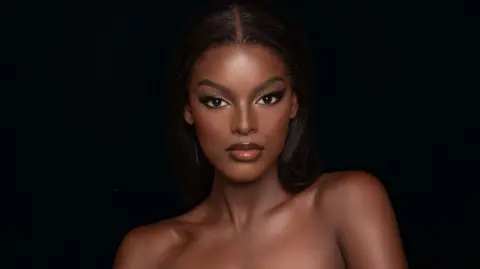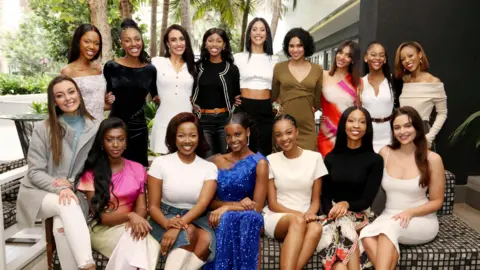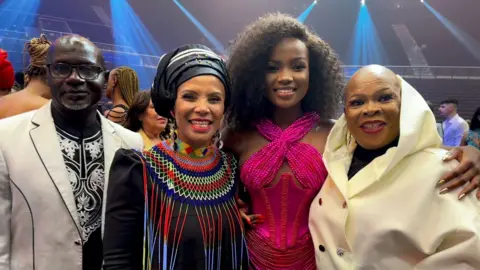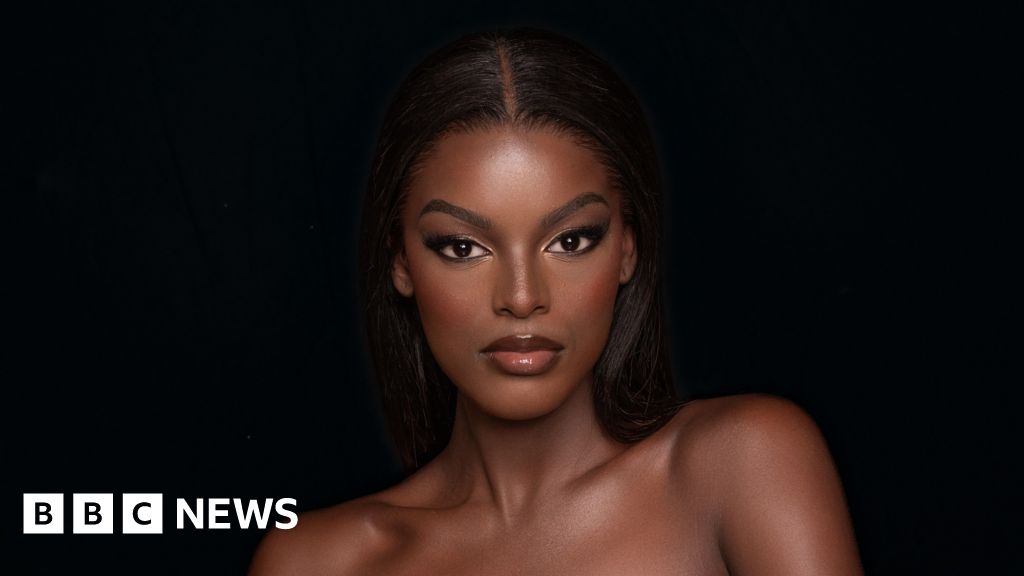 miss south africa
miss south africaWhen law student Chidimma Adetshina was crowned a finalist for the coveted Miss South Africa, her victory sparked a vicious backlash that tapped into the superficial xenophobia of some in the country.
The 23-year-old’s name hinted at her connection to Nigeria, but internet sleuths wanted to know more and combed through every inch of her life. They discovered that her father was Nigerian, and while her mother was South African, her family came from neighboring Mozambique.
“On behalf of South Africans, we don’t recognize her and this name! She better start packing her bags and go home,” one commenter on X fumed.
But where is home? Pageant organizers confirmed Ms Adetshina is South African. She said in interviews that she was born in Soweto – a town next to Johannesburg – and grew up in Cape Town.
Yet a “go home” sentiment, and even harsher attacks, flooded social media. There was also a petition calling for her to withdraw from the high-profile televised competition, which had gathered more than 14,000 signatures before it was taken down.
He was joined by the country’s Culture Minister Gayton McKenzie, leader of the Patriotic Union party, which has joined the coalition government and has made immigration a key part of its platform.
“We really can’t have Nigerians in our Miss SA competition. I want to have all the facts before I comment but it already gives off an interesting vibe,” he said on X.
The question touches a nerve in South Africa, and not just who will be on the final stage next weekend.
 Yolanda Vanderstorp
Yolanda VanderstorpMs Adetshina declined the BBC’s request for an interview but did tell the Sowetan Live news website that the online hate she faced had made her think twice about entering the competition.
“I represent a country, but I don’t feel the love of the people I represent,” she said.
Ms Adetshina added that the whole situation felt like “black on black hatred” and highlighted a particular form of xenophobia in South Africa known as “Afrophobia”, directed against other Africans.
She felt she wasn’t the only one of the final 16 female contestants with a name of foreign origin – some were South Asian and European – but she received most of the criticism.
When asked to respond to the comments faced by Ms Adetshina, a Miss South Africa spokesperson did not respond directly, saying only that she was eligible to compete.
This isn’t the first time this has happened. For last year’s Miss South Africa contestant Melissa Naimuli, it brought back painful memories.
The 28-year-old is also the target of Ms Adetshina’s vitriol because her father is Ugandan.
She told the BBC she was not surprised by the response she received as she has experienced this for most of her life.
“It’s something I’m trying to escape from, but how do you escape yourself?” she asked.
Ms Naimuli said that growing up, she would constantly speak Xhosa, her native language and one of South Africa’s official languages, “to prove her South African heritage”.
Her voice cracks, and she admits to being ashamed of her Ugandan identity as a result of experiencing Afrophobia in her youth.
“I didn’t want to be seen with my father because he was darker and had very revealing East African features,” she told the BBC.
“At home, my father was my hero, but outside, I saw that he was viewed as the enemy.”
Dr Nombulelo Shange, a sociologist at the University of the Free State, linked this hostility to South Africa’s history of racism and apartheid – a system that imposed a strict hierarchy that privileged white people.
“As a country, we are trying to move away from a sad apartheid mentality,” she said.
“It shows the deep self-hatred we have as black South Africans.”
Dr Shange added that South Africans have internalized oppressive racist reasoning, such as colourism, that light skin is better.
After apartheid ended in 1994, Nelson Mandela’s African National Congress (ANC) government welcomed African immigrants and asylum seekers to the country, in part to help Africans reintegrate into the continent after years of isolation .
But with many South Africans struggling financially, foreigners are being targeted by some frustrated with their situation.
Zimbabweans, Nigerians and Somalis, among others, have been accused of robbing South Africans of opportunities and resources.
“Outsiders are seen as competitors for scarce jobs, resources, living space and services,” Michael Morris, head of media at the South African Institute of Race Relations, told the BBC.
He said the growing success of Africans in South Africa “could easily lead to resentment and violence”.
This hostile atmosphere sometimes erupts into attacks. In 2008, the worst violence broke out in South Africa, mainly targeting African foreigners, leaving more than 60 people dead.
“Some black South Africans will argue that Africans from other parts of the continent do not belong in South Africa,” Mr Morris said.
 Melissa Naimuri
Melissa NaimuriMs. Naimuri felt this hostility keenly when her father was arrested more than a decade ago.
“My father was the kindest, gentlest soul in the entire universe,” she said, yet he was treated like a criminal because, she believed, he looked like a foreigner.
When Ms Naimuli’s mother arrived at the police station in the capital, Pretoria, where her husband was being held without any explanation or charges.
Her father was released and Ms. Naimuli’s family never spoke of the incident again.
They often tiptoe around the xenophobia they face, but when xenophobia emerged during last year’s Miss South Africa competition, it was an opportunity for them to address the issue head on. For Ms Naimuli, it was It is also part of the healing process.
Now, seeing Ms. Adetshina suffering the same level of abuse, her heart goes out to her.
“She’s not just a trending topic. She’s a human being. She’s a young woman who was bullied online – and it’s wrong, it’s hurtful and it’s very dangerous,” she said.
But she stressed that xenophobes were a minority and that there were many South Africans calling for unity.
Julius Malema, leader of the opposition Economic Freedom Fighters party, defended Ms Adezna last week, saying: “Why do people want to say she is from Nigeria or Mozambique? She was born here.
Ms Naimuli ended her Miss South Africa journey with this message of coming together.
Last year, when the bright lights shone on her in the final round, she called on Africa to unite in the face of hate.
“Let us unleash the power of Africa. We are one,” she told the raucous auditorium, which cheered her message of unity.
But as discrimination resurfaces, it doesn’t seem to be taking hold.
Ms Adetsshina will have her chance to take the stage next Saturday, but it’s unclear whether she will go head-to-head with her haters.
You might be right too.
 Getty Images/BBC
Getty Images/BBC

